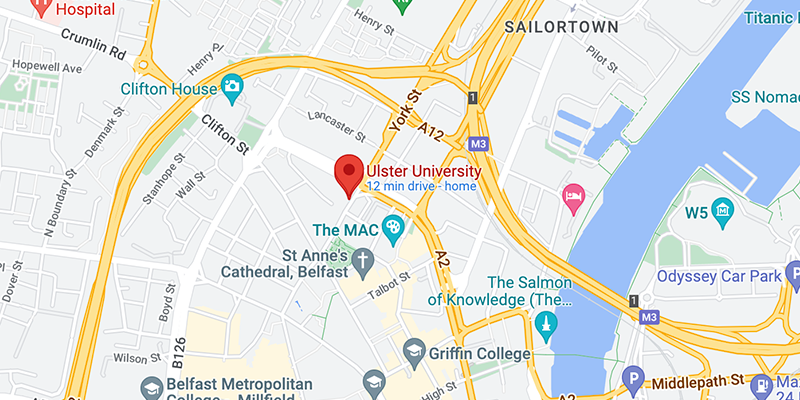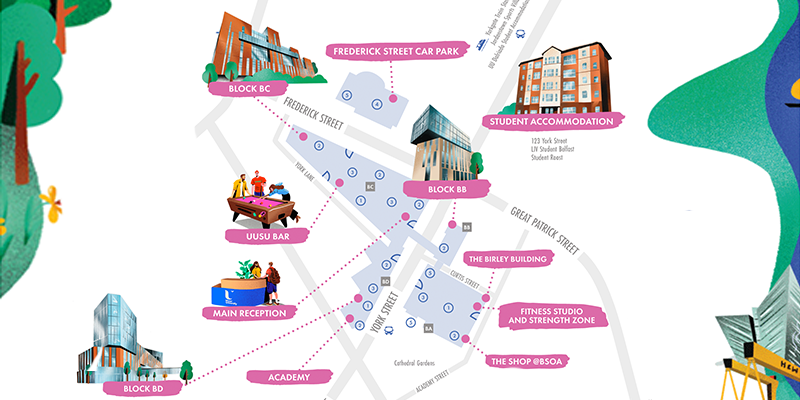About this course
About
The BSc Hons Financial and Investment Management has been designed to meet the needs of the financial services sector.
Year 1 is introductory and focuses on the acquisition and development of personal skills recognised as foundation skills. In this period, you will complete a study skills module designed to equip you with the necessary key communication skills, soft skills and learning strategies to enhance your learning and employability.
Building on year 1, year 2 develops your ability to work effectively in teams. You will be involved in the analysis of more complex operational issues and will continue to develop your IT skills with respect to online financial databases, for example Bloomberg, and other software essential for employment in the finance and investment environment.
After successful completion of year 2, you have the option to complete a placement year in the financial services sector. In final year, modules build on core themes to give you an appreciation of the contemporary issues relevant to finance and investment management.
Modules
Here is a guide to the subjects studied on this course.
Courses are continually reviewed to take advantage of new teaching approaches and developments in research, industry and the professions. Please be aware that modules may change for your year of entry. The exact modules available and their order may vary depending on course updates, staff availability, timetabling and student demand. Please contact the course team for the most up to date module list.
BSc Hons Finance and Investment Management Programme Structure(below is a list of modules in level order)
Year 1
FIN105: Financial Mathematics and Statistics (Level 4, 20 Points, Compulsory)
FIN104: Academic and Professional Skills (Level 4, 20 Points, Compulsory)
ECO112: Microeconomic Principles (Level 4, 20 Points, Compulsory)
FIN101: Accounting for Financial Decision Makers (Level 4, 20 Points, Compulsory)
FIN103: Financial Institutions and Markets (Level 4, 20 Points, Compulsory)
FIN102: Quantitative Methods for Finance (Level 4, 20 Points, Compulsory)
Year 2
FIN308: Career Planning and Skills Development (Level 5, 20 Points, Compulsory)
FIN301: International Financial Reporting (Level 5, 20 Points, Compulsory)
FIN302: Corporate Finance (Level 5, 20 Points, Compulsory)
FIN303: Financial Modelling (Level 5, 20 Points, Compulsory)
FIN304: Money and the Economy (Level 5, 20 Points, Compulsory)
FIN305: Principles of Investing (Level 5, 20 Points, Compulsory)
Year 3
ACF312: Diploma in Professional Practice (DPP) [International] (Level 5, 60 Points, Option)
ACF329: Diploma in International Academic Studies (DIAS) (Level 5, 120 Points, Option)
Year 4
FIN501: Regulation and Ethics (Level 6, 20 Points, Compulsory)
FIN505: International Finance (Level 6, 20 Points, Compulsory)
FIN503: Insurance and Risk Management (Level 6, 20 Points, Option)
FIN504: Behavioural Finance (Level 6, 20 Points, Option)
FIN502: Money, Banking and Financial Development (Level 6, 20 Points, Option)
FIN510: Financial Technology and Data Science (Level 6, 20 Points, Option)
FIN512: Sustainable Finance (Level 6, 20 Points, Option)
FIN507: Portfolio Management (Level 6, 20 Points, Compulsory)
FIN508: Derivatives (Level 6, 20 Points, Compulsory)
FIN506: Financial Statement Analysis (Level 6, 20 Points, Compulsory)
Associate awards
Diploma in Professional Practice DPP
Diploma in International Academic Studies DIAS
Diploma in Professional Practice International DPPI
Attendance
Classes are timetabled per semester for full-time students.
Three years full-time or;
Four years full-time if you undertake an optional placement year between Year 2 and Final Year.
Start dates
Teaching, Learning and Assessment
I will learn
- An in-depth knowledge of financial principles, economic theory and the role of money, institutions, markets and governing bodies.
- Investment skills and knowledge including statistics, financial decision making, modelling, portfolio management, financial reporting, risk management, ethics and regulatory requirements.
- Professional and key communication skills for the world of finance.
Each module adopts a unique assessment strategy and this may include; computer-based
exercises, class tests, essays, oral presentations (individual and group), case studies and "live projects". Each module is assessed by 100% coursework.
Teaching, learning and assessment
The content for each course is summarised on the relevant course page, along with an overview of the modules that make up the course.
Each course is approved by the University and meets the expectations of:
Attendance and Independent Study
As part of your course induction, you will be provided with details of the organisation and management of the course, including attendance and assessment requirements - usually in the form of a timetable. For full-time courses, the precise timetable for each semester is not confirmed until close to the start date and may be subject to some change in the early weeks as all courses settle into their planned patterns. For part-time courses which require attendance on particular days and times, an expectation of the days and periods of attendance will be included in the letter of offer. A course handbook is also made available.
Courses comprise modules for which the notional effort involved is indicated by its credit rating. Each credit point represents 10 hours of student effort. Undergraduate courses typically contain 10, 20, or 40 credit modules (more usually 20) and postgraduate courses typically 15 or 30 credit modules.
The normal study load expectation for an undergraduate full-time course of study in the standard academic year is 120 credit points. This amounts to around 36-42 hours of expected teaching and learning per week, inclusive of attendance requirements for lectures, seminars, tutorials, practical work, fieldwork or other scheduled classes, private study, and assessment. Teaching and learning activities will be in-person and/or online depending on the nature of the course. Part-time study load is the same as full-time pro-rata, with each credit point representing 10 hours of student effort.
Postgraduate Master’s courses typically comprise 180 credits, taken in three semesters when studied full-time. A Postgraduate Certificate (PGCert) comprises 60 credits and can usually be completed on a part-time basis in one year. A 120-credit Postgraduate Diploma (PGDip) can usually be completed on a part-time basis in two years.
Class contact times vary by course and type of module. Typically, for a module predominantly delivered through lectures you can expect at least 3 contact hours per week (lectures/seminars/tutorials). Laboratory classes often require a greater intensity of attendance in blocks. Some modules may combine lecture and laboratory. The precise model will depend on the course you apply for and may be subject to change from year to year for quality or enhancement reasons. Prospective students will be consulted about any significant changes.
Assessment
Assessment methods vary and are defined explicitly in each module. Assessment can be a combination of examination and coursework but may also be only one of these methods. Assessment is designed to assess your achievement of the module’s stated learning outcomes. You can expect to receive timely feedback on all coursework assessments. This feedback may be issued individually and/or issued to the group and you will be encouraged to act on this feedback for your own development.
Coursework can take many forms, for example: essay, report, seminar paper, test, presentation, dissertation, design, artefacts, portfolio, journal, group work. The precise form and combination of assessment will depend on the course you apply for and the module. Details will be made available in advance through induction, the course handbook, the module specification, the assessment timetable and the assessment brief. The details are subject to change from year to year for quality or enhancement reasons. You will be consulted about any significant changes.
Normally, a module will have 4 learning outcomes, and no more than 2 items of assessment. An item of assessment can comprise more than one task. The notional workload and the equivalence across types of assessment is standardised. The module pass mark for undergraduate courses is 40%. The module pass mark for postgraduate courses is 50%.
Calculation of the Final Award
The class of Honours awarded in Bachelor’s degrees is usually determined by calculation of an aggregate mark based on performance across the modules at Levels 5 and 6, (which correspond to the second and third year of full-time attendance).
Level 6 modules contribute 70% of the aggregate mark and Level 5 contributes 30% to the calculation of the class of the award. Classification of integrated Master’s degrees with Honours include a Level 7 component. The calculation in this case is: 50% Level 7, 30% Level 6, 20% Level 5. At least half the Level 5 modules must be studied at the University for Level 5 to be included in the calculation of the class.
All other qualifications have an overall grade determined by results in modules from the final level of study.
In Masters degrees of more than 200 credit points the final 120 points usually determine the overall grading.
Figures correct for academic year 2022-2023.
Academic profile
Over 85% of teaching staff hold Fellowship of Advance HE (formely the Higher Education Academy).
The University employs over 1,000 suitably qualified and experienced academic staff - 60% have PhDs in their subject field and many have professional body recognition.
Courses are taught by staff who are Professors (19%), Readers, Senior Lecturers (22%) or Lecturers (57%).
We require most academic staff to be qualified to teach in higher education: 82% hold either Postgraduate Certificates in Higher Education Practice or higher. Most academic and learning support staff (85%) are recognised as fellows of the Higher Education Academy (HEA) by Advance HE - the university sector professional body for teaching and learning. Many academic and technical staff hold other professional body designations related to their subject or scholarly practice.
The profiles of many academic staff can be found on the University’s departmental websites and give a detailed insight into the range of staffing and expertise. The precise staffing for a course will depend on the department(s) involved and the availability and management of staff. This is subject to change annually and is confirmed in the timetable issued at the start of the course.
Occasionally, teaching may be supplemented by suitably qualified part-time staff (usually qualified researchers) and specialist guest lecturers. In these cases, all staff are inducted, mostly through our staff development programme ‘First Steps to Teaching’. In some cases, usually for provision in one of our out-centres, Recognised University Teachers are involved, supported by the University in suitable professional development for teaching.
Figures correct for academic year 2022-2023.
Standard entry conditions
We recognise a range of qualifications for admission to our courses. In addition to the specific entry conditions for this course you must also meet the University’s General Entrance Requirements.
A level
BBC; or
BCC including one of Mathematics, Economics, Physics or Accounting
Applied General Qualifications
RQF Pearson BTEC Level 3 National Extended Diploma/OCR Cambridge Technical Level 3 Extended Diploma
Award profile of DMM.
To find out if the qualification you are applying with is a qualification we accept for entry, please check our Qualification Checker - https://www.ulster.ac.uk/study/entrance-requirements/equivalence
We will also continue to accept QCF versions of these qualifications although grades asked for may differ. Check what grades you will be asked for by comparing the requirements above with the information under QCF in the Applied General and Tech Level Qualifications section of our Entry Requirements - https://www.ulster.ac.uk/study/entrance-requirements/undergraduate-entry-requirements
Irish Leaving Certificate
112 UCAS tariff points to include a minimum of five subjects (four of which must be at higher level). The overall profile must include English at minimum grade H6 at Higher level or grade O4 at Ordinary level plus Mathematics at H5 at Higher level or O3 at Ordinary level.
OR
104 UCAS tariff points to include a minimum of five subjects (four of which must be at Higher level). The overall profile must include English at minimum grade H6 at Higher Level or grade O4 at Ordinary level. This course also requires you to achieve H3 in one of Mathematics, Economics, Physics or Accounting. If Mathematics is not passed at H3, you will be required to achieve a minimum H5 at Higher level or O3 if studied at Ordinary level in addition to one of the subjects above
Irish Leaving Certificate UCAS Equivalency
Tariff point chart

Scottish Highers
Grades BBCCC or grades BCCCC if undertaking one Scottish Higher from Mathematics, Economics, Physics or Accounting.
Scottish Advanced Highers
Grades CCD or grades CDD if undertaking one Scottish Advanced Higher from Mathematics, Economics, Physics or Accounting.
International Baccalaureate
Overall profile minimum 25 points (12 points at higher level).
Access to Higher Education (HE)
Overall profile of 63% (120 credit Access course) (NI Access course). To include a 20 credit Level 2 Mathematics module, passed at 60% or successful completion of NICATS Mathematics at 60% as part of the pre-2021 Access Diploma or GCSE Maths grade C*/5.
Overall profile of 15 credits at distinction and 30 credits at merit in taught modules (60 credit Access course) (GB Access course)
GCSE
For full-time study, you must satisfy the General Entrance Requirements for admission to a first degree course and hold a GCSE pass at Grade C/4 or above in English Language, plus Mathematics with a minimum grade C*/5.
Please note that for purposes of entry to this course the Level 2 Certificate in Essential Skills - Application of Number is NOT regarded as an acceptable alternative to GCSE Maths.
English Language Requirements
English language requirements for international applicants
The minimum requirement for this course is Academic IELTS 6.0 with no band score less than 5.5. Trinity ISE: Pass at level III also meets this requirement for Tier 4 visa purposes.
Ulster recognises a number of other English language tests and comparable IELTS equivalent score.
Additional Entry Requirements
Acceptable alternative qualifications include:
Pass HND with overall Merit to include 45 distinctions at level 5. Plus GCSE Maths grade C*/5.
Pass HNC with overall Distinction to include 75 distinctions at level 4. Plus GCSE maths grade C*/5.
You may also meet the course entry requirements with combinations of different qualifications to the same standard as recognised by the University (provided subject requirements as noted above are met).
Exemptions and transferability
Most students enter Year 1 of the programme. Applicants who can provide evidence of previous relevant study, awarded in accordance with the Credit Accumulation Transfer Scheme, (CATS), may be considered for entry to Year 2. In appropriate cases, opportunities exist at the end of Year 1 for reciprocal transfer between this programme and other first-degree programmes in the School.




